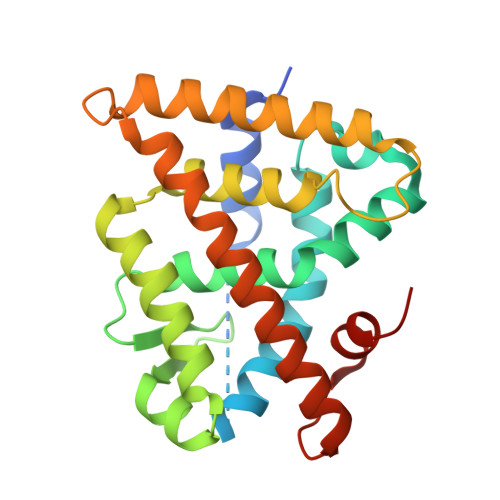Activation of RXR-PPAR heterodimers by organotin environmental endocrine disruptors
le Maire, A., Grimaldi, M., Roecklin, D., Dagnino, S., Vivat-Hannah, V., Balaguer, P., Bourguet, W.(2009) EMBO Rep 10: 367-373
- PubMed: 19270714
- DOI: https://doi.org/10.1038/embor.2009.8
- Primary Citation of Related Structures:
3E94 - PubMed Abstract:
The nuclear receptor retinoid X receptor-alpha (RXR-alpha)-peroxisome proliferator-activated receptor-gamma (PPAR-gamma) heterodimer was recently reported to have a crucial function in mediating the deleterious effects of organotin compounds, which are ubiquitous environmental contaminants. However, because organotins are unrelated to known RXR-alpha and PPAR-gamma ligands, the mechanism by which these compounds bind to and activate the RXR-alpha-PPAR-gamma heterodimer at nanomolar concentrations has remained elusive. Here, we show that tributyltin (TBT) activates all three RXR-PPAR-alpha, -gamma, -delta heterodimers, primarily through its interaction with RXR. In addition, the 1.9 A resolution structure of the RXR-alpha ligand-binding domain in complex with TBT shows a covalent bond between the tin atom and residue Cys 432 of helix H11. This interaction largely accounts for the high binding affinity of TBT, which only partly occupies the RXR-alpha ligand-binding pocket. Our data allow an understanding of the binding and activation properties of the various organotins and suggest a mechanism by which these tin compounds could affect other nuclear receptor signalling pathways.
Organizational Affiliation:
INSERM, U554, Universités Montpellier 1 & 2, 29 rue de Navacelles, 34090 Montpellier, France.

















